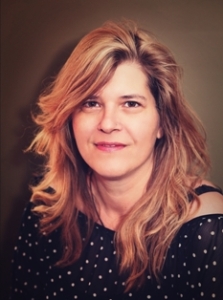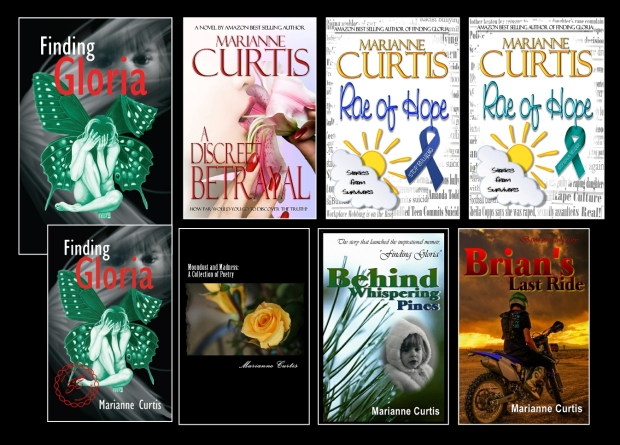 Today we welcome Marianne Curtis, journalist, author and publisher to the table. For the past eighteen years, Ms. Curtis has been the head writer for the Dawson Trail Dispatch, a monthly newspaper in southern Manitoba. As a freelance journalist, she has published over 7,000 articles on a variety of subjects including politics, human interest and community events.
Today we welcome Marianne Curtis, journalist, author and publisher to the table. For the past eighteen years, Ms. Curtis has been the head writer for the Dawson Trail Dispatch, a monthly newspaper in southern Manitoba. As a freelance journalist, she has published over 7,000 articles on a variety of subjects including politics, human interest and community events.
In 2012, Curtis published her first book Finding Gloria, in which she shares heartbreaking abuse as a child, then examines the effects on her life as an adult. This inspirational memoir was named a McNally Robinson Bookstore Bestseller; and Amazon Bestseller in Canada, the US and UK several times. Since then she has added five additional titles to her portfolio, plus a dozen titles published under another name. A firm believer that sharing experiences is important to personal growth and healing, she travels across Canada encouraging others with her story.
In 2014, she founded Oak Island Publications and has designed, laid out and published nine books for other authors. She became the founder and President of Authors of Manitoba in 2015. In addition, she teaches writing, marketing and publishing to other authors.
What genres and authors do you enjoy reading?
I love a great mystery story; something that keeps you guessing right until the end. I grew up devouring Nancy Drew and the Hardy Boys. As an adult, I went through my historical romance phase where I collected Catherine Coulter, and Heather Graham. Then I discovered Anne Rice, Anne Rule, Stephan King, Michael Crichton, John Grisham and Sue Grafton. I also enjoy a good fact based novel or memoir.
What genres do you write in? What age groups are your books for?
As a reporter, I deal with facts on a daily basis, so as an author, most of what I write is true or based on true stories. I find it difficult to “make things up”. I recently challenged myself by writing fiction with A Discreet Betrayal; while it is fiction, there is a level of truth to it. When I first started as a journalist, I wrote to “sound smart”, but the greatest tip my editor ever told me was to assume that everyone reading my work had a grade 10 education. While my books are not written for young adult, they can be read and understood by everyone.
Tell us a little about your most recent release. Where did you get your inspiration?
My most recent release Rae of Hope: Stories from Survivors (Stop Bullying), came out during Anti-Bullying week in 2014. This book came as a result of sharing my story of being bullied and abused while in school, with decision makers from the Province of Manitoba in 2013. My testimony, along with those of many other victims, helped the province lay out the blueprint for Bill 18, an anti-bullying bill. As a result of sharing my story, other survivors confided their similar stories, and I took them, along with a healthy dose of resources and self-help aids and put them together in this volume.
What are you working on now?
Currently I am in the process of collecting stories for Rae of Hope: Stories from Survivors (Stop Sexual Violence), and Rae of Hope: Stories from Survivors (Stop Domestic Violence). Since Rae of Hope: Stories from Survivors (Stop Bullying) came out, people have been opening up and sharing their stories in hopes of help inspire others to take back their power. It seems that many people have similar stories, yet we all feel alone in them. I am also working on a follow up to A Discreet Betrayal; where I continue the challenge of turning real local news into a page turning fiction novel called A Political Deception.
Tell us about your creative process. Do you outline or just write wherever the story takes you? What does your workspace look like? Do you have any habits or quirks when you are writing?
I am what you classify a “weird” writer; I do not have a creative process so to speak. I sit down, open my mind, and see where my thoughts go. I have a habit of writing as if I am telling a story in person. Another thing I’ve noticed – I am ALWAYS writing, even when I am nowhere near a computer or a pen. Sometimes it makes me crazy, this inability to “turn it off” but it also helps me process. When I am confident with my idea (and the little quirks that pop into my head) I sit down and write. It is not uncommon for me to write an entire 80,000 word novel in two weeks.
Which leads me to my quirk – procrastination! As a reporter, I write 40 articles per month, usually in the last 48 hrs before we print. I used to be a heavy smoker – sometimes 3 packs a day during deadline. Smoking was heavily part of my routine – I’d get stuck, light a smoke. I quit smoking August 2014, despite my fear that I would not be able to write any more – thankfully I can still write! Now, when I am done a book or project for myself or someone else, I celebrate with a glass of wine and a hot bath.
What do you find to be the hardest part of writing a novel?
For me, writing the novel is easy; publishing it is easy; the hard part is waiting for feedback. Patience is NOT my virtue. I have sent out hundreds of copies of books and I get very frustrated when people do not write reviews or tell me what they think. For example, A Discreet Betrayal ended in a way two more books could be written, but I am afraid to proceed to book two because not many people got back to me on how they felt about Discreet. Even if it sucks, ESPECIALLY if it sucks, I need to know!
What about the easiest? What parts of the writing process just feel natural for you?
I hate to admit it, but the entire process is natural for me. Not because I am brilliant, but because as a child, writing was the only way I could speak (you would have to read Finding Gloria to fully understand). In my opinion, I express myself much better in writing than I do verbally.
Thank you Marianne, for visiting with us today!
To find out more about Marianne Curtis, or purchase her books, visit her website or blog
- Follow Marianne on Twitter – Writerchick68
- Marianne’s Amazon Author page
- Goodreads; Marianne’s Author page
- Rae of Hope: Stories from Survivors on FB;
- A Discreet Betrayal on FB;
- Authors of Manitoba
- Dawson Trail Dispatch
